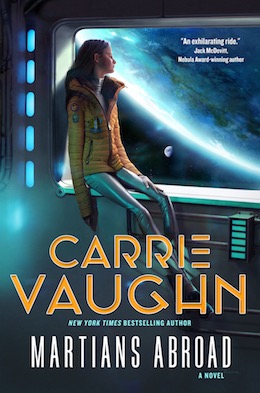Martians Abroad is a new stand-alone novel from Carrie Vaughn, the author most famously responsible for the Kitty Norville, werewolf radio host series. Set in the not-so-far future, it features a solar system where humans have habitats on the moon, colonies on Mars, and habitable stations further out, but Earth is still the wealth-and-culture capital of everything.
Polly Newton is the teenaged daughter of the director of Mars Colony. Her one dream in life is to be a pilot, and she has her future planned out. When her mother decides to send her and her “twin” brother Charles to the exclusive Galileo Academy on Earth, though, Polly’s plans are derailed. Unlike Charles—a genius and a manipulative wee asshole—Polly doesn’t adjust well to the new environment. Isolated and homesick, things aren’t going too well for Polly even before a string of dangerous accidents starts putting her powerful and well-connected classmates at risk. Something is rotten in Galileo Academy, and with their next class trip taking Polly, Charles, and their classmates to the moon, another accident may kill them all.
One of the ways in which I know I’m getting older is that I’m getting pickier. Or possibly crankier—not that I didn’t start out plenty cranky to begin with. And Martians Abroad, for all that it’s readably fun, makes me more cranky the more I consider it.
Let’s start with the voice. Polly recounts her adventures in the first person. And while I’m pretty sure Polly is supposed to be sixteen or older, her voice makes her sound about thirteen. In fact, as far as comparanda go for the tone and voice of the novel, I leap immediately to Sophia McDougall’s middle-grade novel Mars Evacuees—though Mars Evacuees has a lot more whimsy and delight, its voice is similarly naively young and breezy. The difference is, Polly feels unnaturally young and naive for an older adolescent, and her fish-out-of-water experiences with fellow students in Galileo Academy seem apt only for someone who has never experienced human group dynamics on any scale before.
I do like Polly’s natural competence, her growing friendship with the Earther Angelyn, and her thoughtless bravery. And her struggles with living under heavier gravity than she’s been used to her whole life are interesting. It doesn’t change the fact that she seems very young.
And let’s talk about Galileo Academy. A very exclusive boarding school on Earth (perhaps the most exclusive boarding school on Earth, the narrative implies), it offers a three-year programme of studies. It draws its students from the families of the elite, both on Earth and in the rest of the solar system—so presumably even the Earther students come from pretty diverse regional backgrounds and cultures, right?
It’s hard to tell. The general culture of the novel is, for all its effort to make the names sound international (apart from the protagonist and family) pretty solidly American. My suspension of disbelief kept having a weird kind of background bafflement: clearly there are cultural and some physiological differences between the Earthers and the Spacers, but it doesn’t appear that this international (inter-solar-system) boarding school story put much thought into the constraints and cultural differences that intervene when you educate people from different natal cultures together—unless there are no different natal cultures in this future apart from Earther and Spacer, which is a creepy-as-all-hell possibility that the novel doesn’t spend much time exploring. (Where’s the accommodation for religious differences? Dietary restrictions? Cultural norms around clothing?)
It just feels very… old-fashioned. It feels, in fact, rather like Vaughn set out to write a modern Heinlein juvenile—and the finished product has some of the flaws, as well as the virtues, of the form.
Not that Martians Abroad isn’t fun and entertaining to read. It is. But it’s a shallow and flat sort of entertainment, a stale sugar-rush rather than a delicious meal. I’d hoped for a more substantial read.
Martians Abroad is available from Tor Books
Read an excerpt here on Tor.com
Liz Bourke is a cranky queer person who reads books. She holds a Ph.D in Classics from Trinity College, Dublin. Find her at her blog. Or her Twitter. She supports the work of the Irish Refugee Council and the Abortion Rights Campaign.










